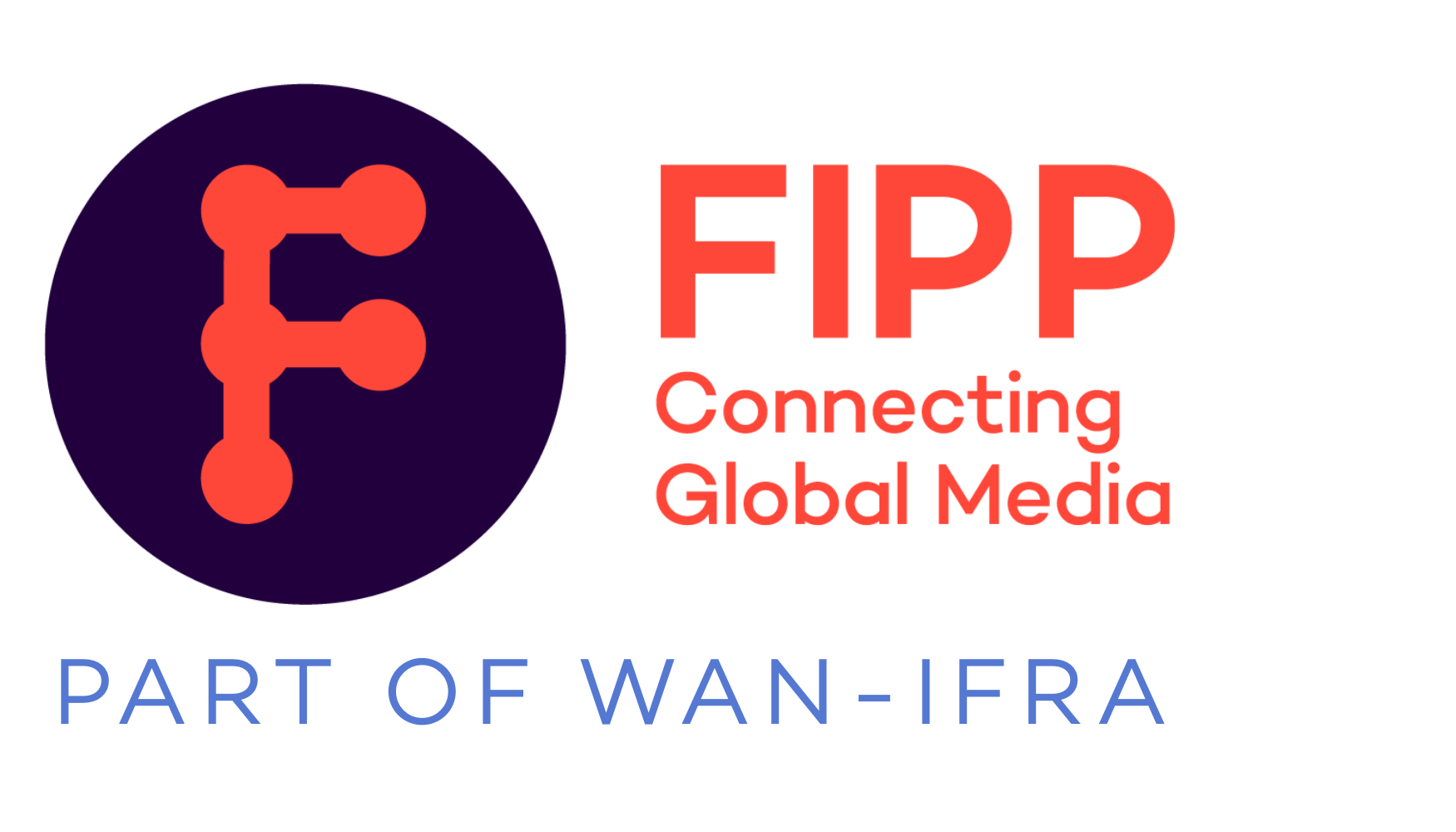[New!] FIPP Global AI in Media Tracker – November 2025
Welcome to the updated edition of the FIPP global media tracker – AI in media edition. This document tracks new developments in AI across global media, from editorial innovation to regulatory shifts. All entries are newly added and do not duplicate content from previous editions unless contextually essential.
CROSS-CONTINENTAL
xAI joins EU Code of Practice with reservations
Elon Musk’s xAI agreed in August to sign the European Union’s AI Code of Practice, though with notable caveats. In a statement, the company expressed support for AI safety, but criticised parts of the Code, especially around copyright, stating it could be “detrimental to innovation.”
Why it matters: Signing the EU’s AI Code keeps xAI at the regulatory table, but ongoing resistance shows tensions between enforcement, ethics, and innovation. Meta declined, Google accepted—showcasing divergent industry strategies around voluntary AI governance in Europe.
Read more here: Musk’s xAI to sign chapter on safety and security in EU’s AI code of practice
EUROPE
ChatEurope (EU consortium) – Multilingual chatbot for EU affairs
Led by AFP with 15 partners across 40 European outlets, ChatEurope offers AI-powered summaries and Q&A on EU policies in multiple languages, using retrieval-augmented generation with transparency safeguards.
Why it matters: A cross-border model of AI-powered news collaboration, providing multilingual, trustworthy summaries of EU affairs to counter misinformation and improve accessibility.
The details can be found here: From AI Regulation to the War in Ukraine: What Users Asked on ChatEurope’s Trusted News Platform
Aftenposten (Norway) – AI-personalised homepage boosts subscriptions
Norway’s Aftenposten revamped its homepage using a hybrid system combining editorial judgement and AI-driven personalisation. Articles are dynamically ranked based on user behaviour and editorial input, resulting in a 25% click-through rate increase and up to 11% subscription uplift.
Why it matters: This is one of the strongest examples of AI being used for homepage optimisation in a high-trust news environment. Aftenposten’s “human-in-the-loop” system is being explored by other publishers seeking balance between personal relevance and editorial mission.
Read more here: How Norway’s Aftenposten reinvented its homepage with AI-powered personalization
Onet Czat (Poland) – Ringier Axel Springer integrates AI chat features
Onet, a major Polish outlet, introduced AI-powered tools such as interactive news chat, article summarisation and personalised digests. Built in-house and guided by editorial content, the tools aim to streamline access to news while enhancing newsroom efficiency.
Why it matters: This is a model of practical AI integration into existing consumer platforms. Prioritising trusted content, it shows how AI can enhance, not replace, editorial operations.
Details in this blog post: Onet Czat with AI creates simplified experience for Ringier Axel Springer Polska readers
ESG District (Belgium) – AI assistant interprets Environmental, Social and Governance (ESG) data
In collaboration with Mediafin and LegalFly, ESG District launched an AI assistant designed to interpret ESG reports. Built with transparency in mind, it avoids hallucinations and ensures neutrality, using secure internal data only.
Why it matters: It is significant for demonstrating AI use in business journalism. Ethical safeguards make it a benchmark for AI models handling financial and regulatory data.
Details in this KPMG article: ESG District – Making the change
Makedonia (Greece) – Personalised newsletters and push notifications
Makedonia has introduced a system that analyses reader behaviour and preferences, delivering tailored news content while combining algorithmic selection with editor-curated stories to avoid filter bubbles.
Why it matters: This shows how hybrid approaches can deepen engagement, build loyalty and support subscriptions while preserving editorial values.
More in this article by JournalismAI: Makedonia embraces AI to rebuild its digital future
L’Eco di Bergamo (Italy) – Obituary archive portal
The Italian newspaper L’Eco di Bergamo has compiled over 320,000 obituaries published since the 1950s into a searchable online database using AI extraction tools.
Why it matters: This culturally resonant use of AI for heritage and memory demonstrates the breadth of applications for AI beyond breaking news.
Details provided by The Fix: How the Italian newspaper L’Eco di Bergamo used AI to create an unprecedented obituary database
Ruhr Nachrichten (Germany) – Local news chatbot experiment
Ruhr Nachrichten built a local news chatbot tasked with finding local stories that achieved strong engagement (91% query success, 31% CTR) but also generated user complaints about errors, leading to clearer disclaimers.\
Why it matters: This highlights the potential and pitfalls of AI engagement tools in local journalism, especially the importance of managing user trust.
More in this article about conversational AI by the NiemanLab: Across Europe, the Middle East, and Africa, newsrooms are experimenting with conversational AI

FIPP Insider New York
5 December 2025
Join us at the iconic Hearst Tower for a morning dedicated to Innovation in Magazine Publishing.
Find out more and secure your place
AFRICA
Al-Masry Al-Youm (Egypt) – Arabic-language archive chatbot
The Cairo-based paper introduced an AI chatbot using Miso.ai tech to help readers search over 3 million archived stories. The system uses semantic search and generative AI, tuned for Arabic language fluency and right-to-left user interface.
Why it matters: A regional first and an important advancement in Arabic-language AI applications for journalism. It increases content accessibility and audience engagement in a linguistically tailored way.
More in this article by the NiemanLab: Across Europe, the Middle East, and Africa, newsrooms are experimenting with conversational AI
Daily Maverick (South Africa) – Tested AI-powered customer service agent
Daily Maverick tested a customer service chatbot with Bridged Media. Accuracy was strong, but it failed to reduce email volume, prompting plans to embed it directly into inboxes.
Why it matters: This experiment shows the limits of chatbot deployment unless fully integrated into workflows.
The NiemanLab has more: Across Europe, the Middle East, and Africa, newsrooms are experimenting with conversational AI
AMERICAS
Gigafact Parser (US) – AI fact-checking tool for political journalism
Gigafact launched an AI-driven tool that transcribes and analyses public statements, highlighting claims made by politicians. It integrates direct uploads, speaker IDs and searchable transcripts to assist fact-checking. It also features a searchable database of hundreds of US politicians, direct YouTube uploads and highlighted claims for quick review.
Why it matters: This tool provides operational support for accountability journalism, streamlining workflows for reporters and elevating transparency in political coverage.
Request trial usage here: Gigafact Parser
El Surti (Paraguay) – AIkuaa builds Guaraní voice datasets
El Surti is leading an initiative to collect open voice datasets and AI tools for the Guaraní language, through community-led hackathons called mingas.
Why it matters: This inclusive, community-driven model for Indigenous language AI, expands representation and access in digital media.
More from the Reuters Institute: These pioneers are working to keep their countries’ languages alive in the age of AI news
Pública IQ (Brazil) – AI to measure impact of investigative journalism
Agência Pública created an internal workflow using ChatGPT to automate monitoring and categorisation of media mentions, helping measure the broader impact of its journalism. Human oversight ensures accuracy and quality control.
Why it matters: This shows how investigative newsrooms can harness AI to track their influence beyond simple republication counts.
JournalismAI has more: Using genAI to understand impact of journalism: The Agência Pública story
VERDAD (US) – Monitoring misinformation in Spanish-language radio
Public Data Works developed VERDAD, a tool that records and transcribes around 1,000 hours of Spanish-language radio daily, using LLMs to identify and categorise potential misinformation for human review.
Why it matters: It is a scalable, collaborative model for detecting misinformation across underserved media channels, particularly critical for Spanish-speaking audiences in the US.
Missouri School of Journalism has more: VERDAD is tackling the blind spot in the fight against radio disinformation
The City NYC (US) – Mapping newsroom coverage with AI
The City’s AI-powered coverage audit, launched in late 2024, has now been running long enough to provide meaningful insights into how local newsrooms can track their reach across communities. The project uses LLMs to extract and geocode locations from thousands of stories, then visualises them on an interactive map. The tool has revealed persistent coverage gaps in certain boroughs while confirming saturation in others.
Why it matters: With a year of results now visible, this experiment is a timely example of how AI can support editorial self-audits and help ensure equitable coverage across neighbourhoods.
Read more here: Case Study: THE CITY’s AI-Powered Coverage Audit and Navigation Tool
Fortune Intelligence (US) – AI-assisted breaking business news
Fortune has reintroduced Fortune Intelligence, a specially designed newsroom initiative that blends generative AI tools with human editorial oversight to produce breaking business news, graphics, and podcast-ready content. Former editor Nick Lichtenberg leads the effort, described as an effort to “surf this wave, not get pummeled by it.”
Why it matters: It exemplifies how legacy business media can adopt AI to accelerate publishing while ensuring trusted, high-quality journalism.
Read more here: Fortune and Axios warm to AI
Associated Press (US) – Local Lede identifies regulatory stories
Since its launch in 2024, AP Local Lede has matured into a vital tool in 2025. Powered by AI through a collaboration with AppliedXL, the system continually sifts through updates from over 430 US federal agencies, delivering context-rich, locally tailored story tips through AP Newsroom.
Why it matters: More than a pilot, Local Lede now stands as a stable, proactive service that equips local journalists with timely, actionable leads—turning complex regulations into community-level reporting opportunities.
The latest here: AppliedXL and Associated Press team up to use AI to sift through federal regulations
Lars (Wall Street Journal, US) – Tax advice chatbot
The Wall Street Journal developed Lars, a chatbot using retrieval-augmented generation to answer readers’ tax-related queries, drawing on WSJ coverage and official tax authority content. It proved resilient to off-topic misuse.
Why it matters: Shows how retrieval-augmented AI can safely deliver specialised, high-stakes information with safeguards against error and misuse.
More here: Wall Street Journal taxbot answers questions (while readers try to break it)
ASIA
Gubbi Labs (India) – AI for science communication
Gubbi Labs launched an AI-powered platform that identifies recent research papers, assesses their newsworthiness, and generates summaries and multimedia outputs, including regional-language podcasts.
Why it matters: A striking example of AI supporting science communication, bridging the gap between complex research and accessible journalism.
More from JournalismAI here: How AI is helping to amplify science communication
United Daily News Group (Taiwan) – Multilingual AI content tools
Taiwan’s United Daily News Group has developed AI systems for multilingual content adaptation and automated translation services.
Why it matters: Expands reach across linguistic communities, demonstrating how AI can support multilingual journalism in culturally sensitive ways.
More from the World Association of News Publishers (WAN-IFRA): Data drives 280% subscription growth at Taiwan’s United Daily News Group
AUSTRALASIA
News Corp Australia – Internal AI tools and newsroom innovation
In March 2025, News Corp Australia began rolling out NewsGPT, a proprietary AI model combining ChatGPT, Google Gemini, and Anthropic Claude, promising to “enhance, not replace” staff and safeguard data privacy. By June, journalists raised concerns about its potential to mimic their writing styles and displace sub-editors, especially with the introduction of another tool, Story Cutter.
Why it matters: This marks deep AI integration at enterprise scale, spotlighting ethical, workflow and employment implications alongside innovation.
Some perspective from The Guardian here: News Corp bets big on AI tools but journalists voice concerns
Guardian Australia – OpenAI deal goes live
In February 2025, Guardian Media Group signed a strategic partnership with OpenAI, enabling Guardian journalism and archives to be used as a news source within ChatGPT, with properly attributed summaries and article extracts. The deal also included rolling out ChatGPT Enterprise across the organisation to co-develop new AI-powered tools and reader experiences. Importantly, the agreement continues to reflect the Guardian’s editorial safeguards: human oversight, fair compensation and transparency remain central.
Why it matters: This represents one of the first major media–AI platform collaborations moving from theory to practice. It demonstrates the potential for scale while highlighting the editorial controls necessary to ensure it is both ethical and sustainable.
More here: Guardian Media Group announces strategic partnership with OpenAI









